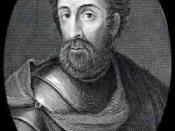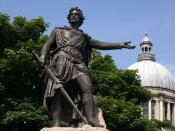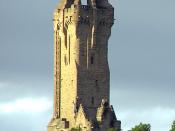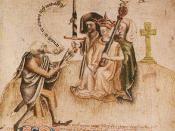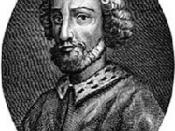Patricia Nelson Limerick is one of the country's most outstanding historians. She is a revisionist historian who revises the usual stories that we believe are true. Limerick especially focuses on the American West dealing with accounts of the "Cowboys and Indians". While writing about these historical events, she has to take into account different cultural beliefs and other biases. She also deals with problems concerning myth, fixed ideas, and point of view. Limerick says, "One skill essential to the writing of Western American history is a capacity to deal with multiple view points. It is as if one were a lawyer at a trial designed on the principle of the Mad Hatter's tea party--as soon as one begins to understand and empathize with the plaintiff's case, it is time to move over and empathize with the defendant." (Limerick, 501) I chose the historical epic, "Braveheart", to follow in Limericks steps and view the movie from different points of views.
In this movie, there are only two sides fighting, but there are many different ideas on solving this one conflict.
The movie starts off in 1280 A.D. in Scotland. The King of Scotland has died and there is no son to take the throne. Edward the Long Shanks, the King of England, has claimed the Scottish throne for himself. Scotland is finally fed up with the English King and the people and try to do anything in their will to gain their freedom back from England.
William Wallace is a commoner from Scotland who will do anything to have Scotland become a free country again and get out from underneath the rule of the English King. Wallace is not only a strong man and a great fighter, but also has an amazing intellect. As a young boy, Wallace journeyed under the arm of his Uncle Argyle to Rome and Greece on a homage and learned the French and Latin language. He knew that combat was not only done with swords and steel, but also with the mind. From these admirable characteristics, Wallace was looked up to by both the Scottish nobleman and the commoners. At first, Wallace's opinion of the battles to achieve freedom from England, was to keep away from all the violence. He did not want to be involved in those types of issues. The moment when he got involved is when the English nobleman practiced the "prim net octet" on his secretive wife and and the nobleman murdered her on the stake. This is a practice that the King of England enforced. It stated that an English nobleman would have the first night with a Scottish woman on her wedding day. The King believed this was a way to get rid of Scots, and populate Scotland with English children. Wallace knew after this horrific moment that he would do anything in his power to make Scotland a free country again.
Furthermore, the Scottish noblemen had a very different view on gaining the throne from England. The noblemen were in no hurry to overcome this disagreement. They had already been getting estates from the English King and hereditary titles. Even though they were still paying taxes to the King, they were somewhat satisfied at the events that were going on. The longer they were under the rule of the Enlish King, hte more money and land they would be getting. At points they were in fear of these battles because they panicked that they would lose the wealth they were gaining from England. In fact Wallace stated to the Scottish noblemen, "You think the people of this country exist to provide you with possession. I think your possession exists to provide those people with freedom and I go to make sure that they have it." (M. Gibson Producer and Director) After these powerful words, Robert the seventeenth Earl of Bruce led his army to freedom after Wallace was executed for treason.
Moreover, on the other side of this conflict, the King of England had a completely different outlook on who was to sit in the throne of Scotland, if anyone at all. The English people of this epic were viewed through out the movie as the "bad guys". King Edward the Long Shanks was a very ruthless King. He believed that Scotland should have absolutely no rights and be totally ruled by England. Even though Scotland did not enjoy the rights of England, taxes were paid by both countries. The King thought of the countries as one. Edward the Long Shanks would bribe both the Scottish and English noblemen to carry out what he wanted done. He was also very merciless. He commanded his men to kill Wallace no matter what it took, even the death of English soldiers. He would later get ill and die, having his incompetent son take over the throne. This paragraph shows that the epic was biased and how the viewers would look down on England and especially their King.
In conclusion, if a historian were to look at this historical epic, one would not be able to write and accurate history on the conflicts between Scotland and England. This movie is based on a true account, but often brings in the view of the director to make it more interesting and a true love story. Moreover, the epic makes it out to be that the English are the so called "bad guys". Throughout the whole movie there is not one time that the viewer is agreeing with the English King. We empathize for the Scottish commoners through all the blood, guts, and glory. Thus if a historian were to view this movie, the English people would not be accurately represented. It is as though the viewer is going through these obstacles through the eyes of the Scottish men, women, and children. On the other hand, there are many accounts that are real facts. As seen in the movie and as seen in history, William Wallace was a strong man with fervid patriotism that devoted his life to winning back the independence of his country, Scotland. In addition, the battles such as the Battle of Sterling, all were true encounters between the feuding countries. Once again, a historian such as Limerick viewing this amazing epic would get a good sense of the conflict between the two countries, but many points of view would interfere with an accurate writing of the history of the battles for the Scottish throne.

